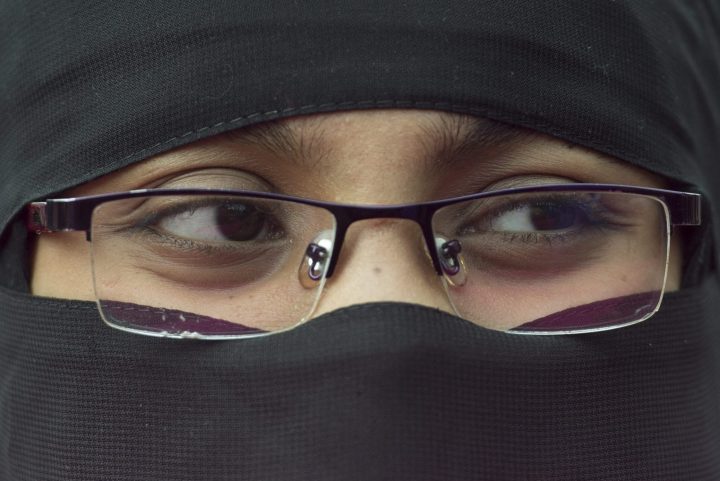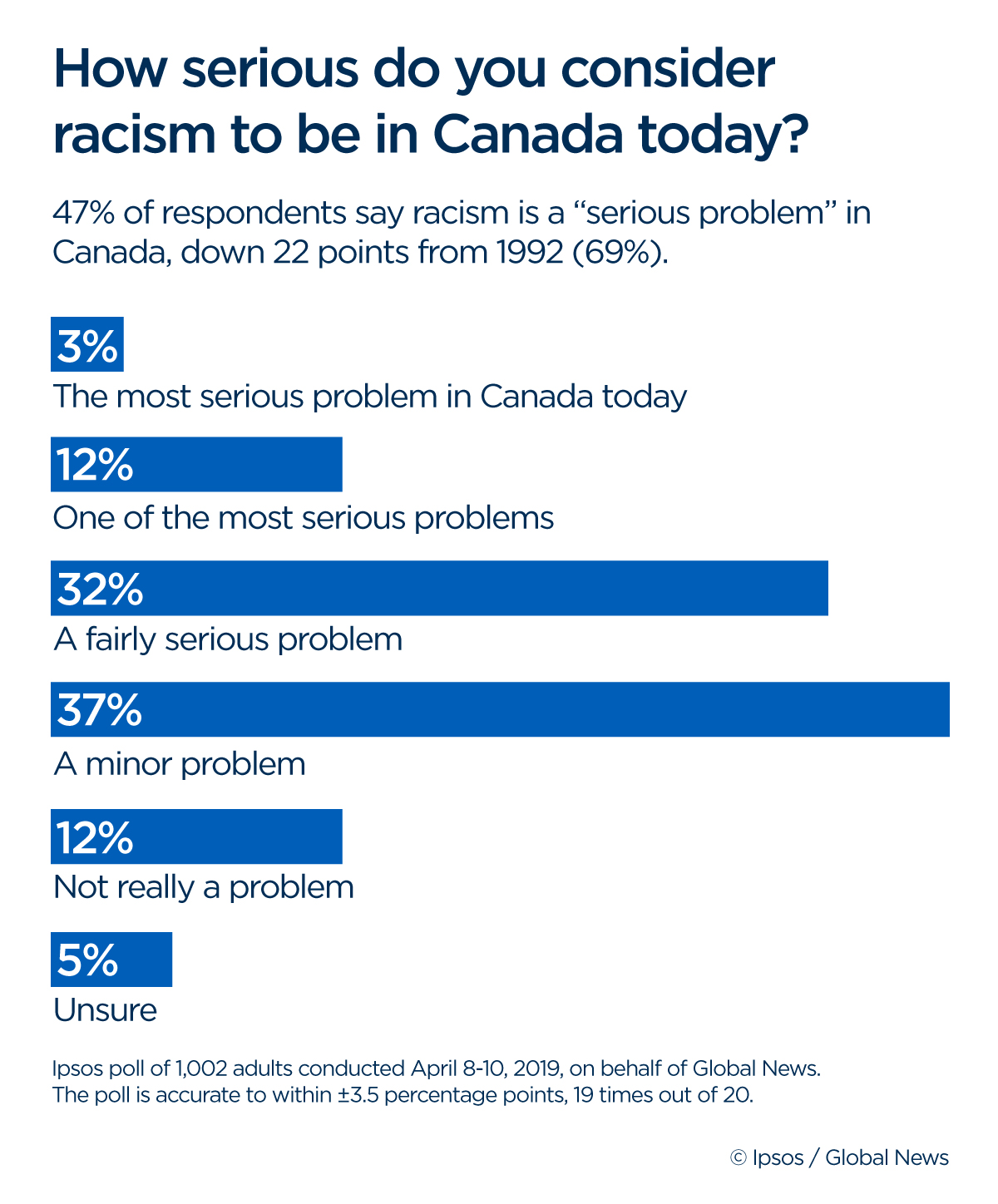Almost half of Canadians will admit to having racist thoughts, and more feel comfortable expressing them today than in years past, a new Ipsos poll reveals.

The results land amid an uptick in the number of people who reported facing racism first-hand.
The poll, conducted exclusively for Global News, found that 47 per cent of respondents thought racism was a serious problem in the country, down from 69 per cent in 1992. More than three-quarters of respondents said they were not racist, but many acknowledged having racist thoughts they did not share with others. (All of the Ipsos poll data is available online.)
“We found that (almost) 50 per cent of Canadians believe it’s OK and actually normal to have racist thoughts,” said Sean Simpson, vice-president of Ipsos Public Affairs.
Simpson says Canadians have generally become more open to discussing race since 1992, “perhaps because we have bigger problems in Canada than racism.”
WATCH: Senator suspended after refusing to remove racist letters from website

Nevertheless, the problem remains acute for many Canadians, including Muslims, who are seen as the most likely targets of racism. The poll found that 26 per cent of Canadians believe it has become more acceptable to be prejudiced against Muslims and Arabs.
The Ipsos poll also revealed that racist stereotypes are alive and simmering in Canada. These stereotypes were slightly stronger in Quebec, where respondents were more likely to believe prejudiced theories against Muslims and Jewish people.
For example, 39 per cent of Quebec respondents believed Muslims follow Shariah instead of Canadian laws. Overall, the Ipsos poll revealed that approximately three in 10 Canadians believe the Shariah stereotype, and two in 10 believe Jewish people control Canada’s financial system and the media.
WATCH: Montrealers march against racism and hate

Simpson says these stereotypes can become political pressure points when enough people endorse them.

Get daily National news
“It’s not important whether or not these things actually happen,” he said. “If people believe it, even if it’s not true, then politicians feel they have to react to it.”
Simpson says some politicians, such as U.S. President Donald Trump and People’s Party of Canada leader Maxime Bernier, have helped people feel more comfortable with pushing the boundaries of the race discussion.
“They are saying things that people, up to now, had been reluctant to say out loud, even if they thought it,” Simpson told Global News.
WATCH: Trump claims he’s the ‘least racist person’

Visible minorities in Canada are approximately twice as likely to see racism as a serious problem and nearly three times as likely to be victims, according to the poll results. Visible minorities were also more likely to think racist thoughts.
“We have to remember that racism isn’t necessarily just from white people to black people or from Arabs to Jews or vice versa,” Simpson said.
Twenty-three per cent of respondents said they had personally been victims of racism, a five per cent increase from 2005. It’s also slightly down from the 25 per cent who said they were targets of racism in 2017.
That was a bad year for hate crime in Canada, according to police statistics released by Statistics Canada last month. Police-reported hate crimes increased by 47 per cent from 2016 to 2017, according to the statistics. Hate crimes motivated by religion were up 83 per cent over that same time period. Many of the cases targeted Muslims and Arabs in Montreal and the Toronto area.
WATCH: ‘We must do better’ at fighting Islamophobia in the workplace, unions say

The Ipsos poll found that attitudes toward interracial relationships and neighbours of another race have remained roughly the same since 2005.
Fifteen per cent of respondents said they would never marry or have a relationship with someone of a different race. Simpson says this is likely due to some immigrants hanging onto traditional beliefs around marriage and faith.
The poll also revealed a strong correlation between education level and racist attitudes, Simpson said.
“Those people in Canada who are least tolerant are those with the least amount of formal education,” he said.
Simpson suggests people who attend post-secondary school are more likely to think critically and challenge stereotypes among their own friends and family.
The poll found that nearly four in 10 people felt that immigration was a threat to white Canadians, and people who did not finish high school were the most likely ones to express this belief.
LISTEN: Alan Carter is joined by guest Bernie Farber, Chair of the Canadian Anti-hate network, to examine the IPSOS poll on racism in Canada
Simpson says this so-called “threat” could be something different for each respondent, from the “Great Replacement” conspiracy theory espoused by white nationalists to Quebec residents’ anxiety about preserving their cultural identity.
“The threat is not universal,” he said. “The threat is self-perceived.”
The Ipsos poll found that 32 per cent of people felt freer to express their views about religion and other ethnicities, and those who make between $60,000 and $100,000 annually were more likely to feel that way.
The poll also found that nine out of 10 Canadians believe racism is a terrible thing.
These are some of the findings of an Ipsos poll conducted between April 8 and 10, 2019, on behalf of Global News. For this survey, a sample of 1,002 adults living in Canada was polled. Weighting was then employed to balance demographics to ensure that the sample’s composition reflects that of the adult population according to census data and to provide results intended to approximate the sample universe. The precision of Ipsos online polls is measured using a credibility interval. In this case, the poll is accurate to within ±3.5 percentage points, 19 times out of 20, had all Canadian adults been polled. The credibility interval will be wider among subsets of the population. All sample surveys and polls may be subject to other sources of error, including, but not limited to, coverage error and measurement error.
- Real Canadian Superstore fined for ‘misleading’ Product of Canada displays
- Danielle Smith promises Alberta referendum over immigration, Constitution changes
- ‘No reason to continue discussing’: Ontario mayor wants Andrew’s name dropped
- Canadian Tire says Triangle Rewards are its ‘linchpin’ for growth








.jpg?h=article-hero-560-keepratio&w=article-hero-small-keepratio&crop=1&quality=70&strip=all)
Comments
Want to discuss? Please read our Commenting Policy first.